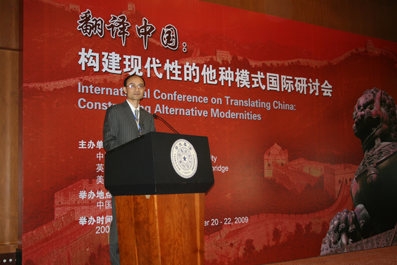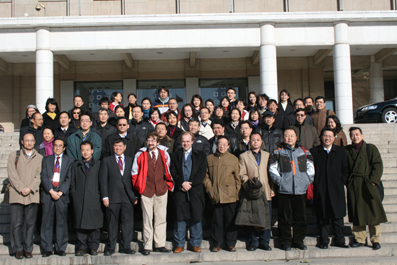
The International Conference on Translating China and Reconstructing Alternative Modernities was held in Beijing on November 20-22, 2009. It was jointly sponsored by Tsinghua University’s Department of Foreign Languages and Center for Comparative Literature and Cultural Studies, the Center for Research in Arts, Social Sciences and Humanities (CRASSH) at the University of Cambridge and the Council on East Asian Studies at Yale University. The co-sponsors also included Tsinghua University’s Asia Research Center and the Institute of Arts and Humanities at Shanghai Jiaotong University. Over 50 scholars from domestic and international universities or research institutes participated, and many of them presented papers.
Vice President Xie Weihe delivered a welcome speech on behalf of Tsinghua University, in which he recounted the golden era when Tsinghua was renowned for its groundbreaking endeavors in the humanities and social sciences. He expressed his hope that in today’s context of developing it into a world-class university, its scholars would make notable contributions to moving Chinese culture around the world.

The conference was presided over by Professor Wang Ning, Director of Tsinghua’s Center for Comparative Literature and Cultural Studies. He read letters of congratulation by Professor Mary Jacobus, Fellow of the British Academy and Director of CRASSH, and Professor Huan Saussy, Fellow of the American Academy of Arts and Sciences and Chair of the Council on East Asian Studies at Yale, who were unable to attend due to ill health. After a short opening ceremony, Wang Ning and Zhao Suisheng, Professor of International Relations of the University of Denver, delivered keynote speeches.
Zhao pointed out that although most recent US presidents had initially experienced difficulty in their relations with China, President Obama has begun his smoothly and maintained a momentum of cooperation with China during his first year in the White House. Zhao also explored three questions in current Sino-American relations: 1) How Obama’s positive engagement policy has differed from that of his predecessor and contributed to a smooth transition, 2) whether this cooperative relationship reflects a moment of convenience or a lasting trend, and 3) challenges confronting the Obama administration.
Wang’s speech, chiefly from a cultural and literary perspective, began with a change in the definition of "translation" in today’s context. It has gone far beyond mere linguistic rendition to encompass cultural transformation. In the large-scale translation of Western cultural trends and literary works in the early 21st century, modern Chinese literature forms a unique tradition of its own, which enables it to engage in dialogue with both classical Chinese and modern Western literature. Questioning the American scholar Fredric Jameson’s construction and critique of a singular modernity, he offered his reconstruction of alternative modernity or modernities. He pointed out that the formation of Chinese modernity has not only deconstructed the Westcentric “singular modernity” but also contributed to the grand discourse of global modernity.
During three days of presentations and discussions, several cutting edge issues were explored, including 1) cultural translation and cultural transformation, 2) modernity and globalization in a cross-cultural context, 3) cultural translation and the formation of Chinese modernity, 4) alternative modernity or pluralist modernities constructed and reconstructed, 5) the representation of the Chinese image in international media, 6) literary translation and canon reformation, 7) translating and interpreting China’s image in a global context, 8) international relations in the post-Cold War period;and 9) China in the process of globalization.

It was understood that this high-level conference is an important step for the internationalization of Tsinghua University’s humanities and social sciences, and accordingly, it can make a great impact both domestically and internationally. Wang Ning will edit a special issue of the internationally prestigious Journal of Contemporary China based on the conference papers. The Journal of Chinese Philosophy will also publish some of them.
According to Professor Wang, during Professor Jacobus’visit to Tsinghua in 2007 their two universities agreed to hold in the following two years three conferences in Cambridge, New Haven, and Beijing. The general theme would be “translating China, translating modernity and translating culture". This initially bilateral collaborative project was financially supported by the Arts and Humanities Research Council of Britain and then enthusiastically joined by Yale University’s Council on East Asian Studies, thus forming the current triple collaboration. Although the present conference has completed the first envisaged cycle, according to Wang, Jacobus and Saussy, its significance also lies in their future cooperation.
Those present at the conference include Professors Liu Kang, Sheldon Lu, Lu Jiande, Wang Hui,Liu Dong, Sun Yifeng, King-kok Cheung, Ding Ersu, Charles Laughlin, Gao Xudong, Karl Zhang, Luo Xuanmin, Chen Yongguo, Tian Chenshan, Tao Jiajun and He Chengzhou.
(From the Department of Foreign Languages)

